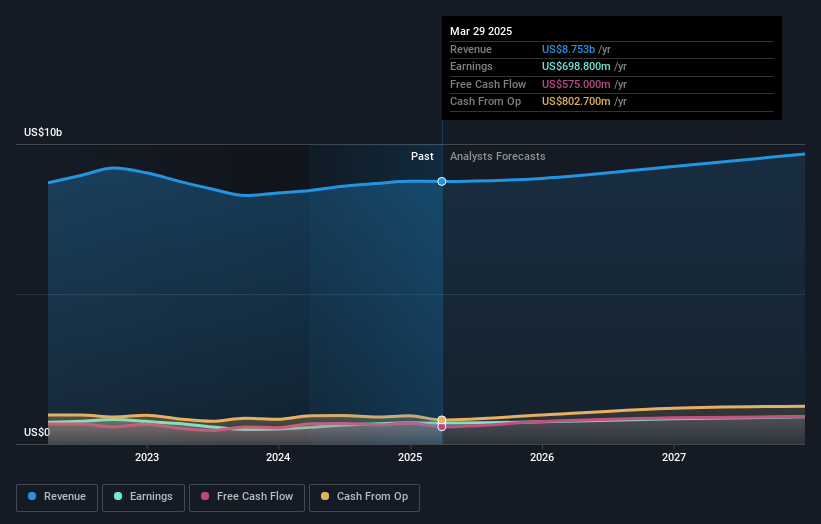Avery Dennison Corporation Earnings Missed Analyst Estimates: Here's What Analysts Are Forecasting Now
Last week saw the newest quarterly earnings release from Avery Dennison Corporation (NYSE:AVY), an important milestone in the company's journey to build a stronger business. It was not a great result overall. While revenues of US$2.1b were in line with analyst predictions, earnings were less than expected, missing statutory estimates by 10% to hit US$2.09 per share. Following the result, the analysts have updated their earnings model, and it would be good to know whether they think there's been a strong change in the company's prospects, or if it's business as usual. With this in mind, we've gathered the latest statutory forecasts to see what the analysts are expecting for next year.
We've discovered 2 warning signs about Avery Dennison. View them for free.
Following last week's earnings report, Avery Dennison's 14 analysts are forecasting 2025 revenues to be US$8.85b, approximately in line with the last 12 months. Per-share earnings are expected to accumulate 3.7% to US$9.18. Yet prior to the latest earnings, the analysts had been anticipated revenues of US$8.95b and earnings per share (EPS) of US$9.91 in 2025. So it looks like there's been a small decline in overall sentiment after the recent results - there's been no major change to revenue estimates, but the analysts did make a small dip in their earnings per share forecasts.
See our latest analysis for Avery Dennison
The consensus price target held steady at US$193, with the analysts seemingly voting that their lower forecast earnings are not expected to lead to a lower stock price in the foreseeable future. That's not the only conclusion we can draw from this data however, as some investors also like to consider the spread in estimates when evaluating analyst price targets. Currently, the most bullish analyst values Avery Dennison at US$226 per share, while the most bearish prices it at US$166. This shows there is still a bit of diversity in estimates, but analysts don't appear to be totally split on the stock as though it might be a success or failure situation.
One way to get more context on these forecasts is to look at how they compare to both past performance, and how other companies in the same industry are performing. It's pretty clear that there is an expectation that Avery Dennison's revenue growth will slow down substantially, with revenues to the end of 2025 expected to display 1.5% growth on an annualised basis. This is compared to a historical growth rate of 4.5% over the past five years. Compare this against other companies (with analyst forecasts) in the industry, which are in aggregate expected to see revenue growth of 5.1% annually. Factoring in the forecast slowdown in growth, it seems obvious that Avery Dennison is also expected to grow slower than other industry participants.
The Bottom Line
The most important thing to take away is that the analysts downgraded their earnings per share estimates, showing that there has been a clear decline in sentiment following these results. Fortunately, the analysts also reconfirmed their revenue estimates, suggesting that it's tracking in line with expectations. Although our data does suggest that Avery Dennison's revenue is expected to perform worse than the wider industry. The consensus price target held steady at US$193, with the latest estimates not enough to have an impact on their price targets.
Following on from that line of thought, we think that the long-term prospects of the business are much more relevant than next year's earnings. We have estimates - from multiple Avery Dennison analysts - going out to 2027, and you can see them free on our platform here.
You still need to take note of risks, for example - Avery Dennison has 2 warning signs we think you should be aware of.
Have feedback on this article? Concerned about the content? Get in touch with us directly. Alternatively, email editorial-team (at) simplywallst.com.
This article by Simply Wall St is general in nature. We provide commentary based on historical data and analyst forecasts only using an unbiased methodology and our articles are not intended to be financial advice. It does not constitute a recommendation to buy or sell any stock, and does not take account of your objectives, or your financial situation. We aim to bring you long-term focused analysis driven by fundamental data. Note that our analysis may not factor in the latest price-sensitive company announcements or qualitative material. Simply Wall St has no position in any stocks mentioned.
 Wall Street Journal
Wall Street Journal